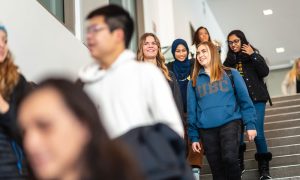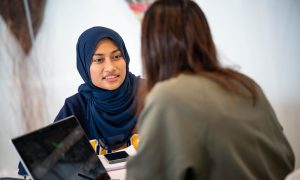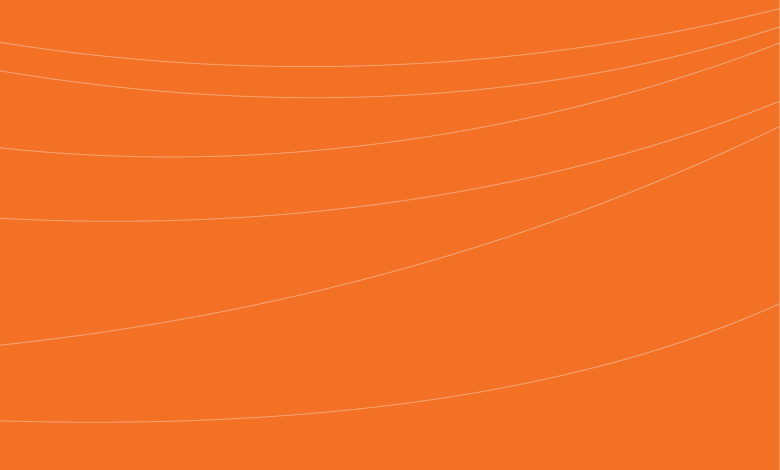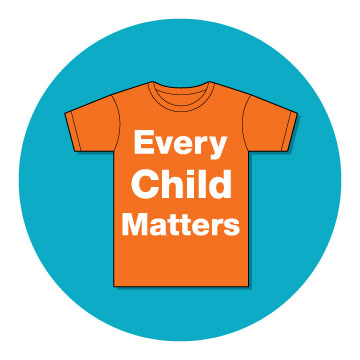
Every child matters
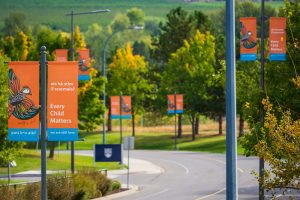 Why are the banners on campus orange?
Why are the banners on campus orange?
In September 2022, UBC—in collaboration with the Okanagan Nation Alliance—installed orange banners at UBC’s Okanagan campus in recognition of Orange Shirt Day and the National Day for Truth and Reconciliation. The banners will be installed again for September 2023.
The image featured on the banners, which was designed by Billie Kruger, depicts a flying bird with rainbow wings, lined with the statements “əts há stim iʔ scəcmalaʔ” and “puti kʷu aláʔ” —which translates to “every child matters” and “we are still here”.
These phrases are like the wind beneath the bird’s wings that are lifting them up and supporting them—much like how such affirmations help our people rise up and soar.
Story Behind the Imagery
In the story of “qʷʕay snk̓lip” (Blue Coyote), snk̓lip continues to battle the nʔałnasqilxʷtn (people eaters). He struggles with his mental health after the weight of his journeys takes a toll on his spirit. He is reminded by his loved ones to take care of himself to properly fulfill his purpose.
He returns to the siwɬkʷ (water) where he sees a bird bathing in the river. This bird is seen after snk̓lip opens his eyes from crying and crying until there was no tears left. He sees the bird washing themselves, encouraging him to do the same. Once washed, snk̓lip shakes his fur, creating a rainbow with the mist. siwɬkʷ is considered medicine and a release for the trauma and pain he is carrying, which symbolizes how our smallest to biggest warriors need to heal. This bird is also referred to as a “they/them” and has colouring of a rainbow on their wings as a representation of our Syilx 2SLGBTQIA+ relatives.
This imagery advocates for our inclusivity, transformation, and the importance of self-care, and was chosen for our orange shirts to carry on the healing of our people from traumatic events such as impacts from Indian Residential Schools, while reinforcing the importance of kʷu k̓ʷul̓ɬt iʔ spuʔús — taking care of your heart. In the face of such impacts, and as we grapple with the trauma created by colonial practices and institutions, we affirm that “əts ha’ stim iʔ scəcmalaʔ” (every child matters). On top of this we emphasize “puti kʷu aláʔ” (we are still here), a testament to Syilx persistence and resilience — that even in the face of extraordinary challenges we are thriving and be here for generations to come.
About the Artist
Billie Kruger is a Syilx Okanagan Nation interdisciplinary artist from the Okanagan Indian Band. She studied at the En’owkin Center and Paul Creek Language Association, and a beginner nsyilxcn speaker.
Billie has created many works: sewing, beading, and traditional art practice. She has a strong connection to the land and her ancestors, to which she attributes her success as an artist.
The Orange Shirt Day Story
Orange Shirt Day began in 2013 when Phyllis Jack Webstad, a Northern Secwpemc (Shuswap) woman from the Stswecem’c Xgat’tem First Nation (Canoe Creek Indian Band), shared her story to bring awareness to the impact and harm of Canada’s Indian residential school system on thousands of Indigenous children.
When she was six years old and beginning school at the St. Joseph Mission Residential School, Phyllis remembers proudly wearing a new and shiny, orange shirt. Her first day of school, Phyllis was stripped of all her clothes, including her new shirt, which she never saw again. Read more about Phyllis’ story.
September 30 was chosen as the date to recognize Orange Shirt Day as it was the typical time of year that Indigenous children were forcibly removed from their homes and sent to residential schools.
National Day for Truth and Reconciliation
In the wake of the uncovering of the remains of 215 children at the site of the Kamloops Indian Residential School in May 2021, and subsequent investigations and findings of thousands more children at other residential schools across Canada, the federal government established September 30 as the National Day for Truth and Reconciliation.
This day was recommended by the Truth and Reconciliation Commission of Canada in its 2015 calls to action. Action 80 called upon the federal government, in collaboration with Indigenous peoples, to establish a statutory holiday “to honour Survivors, their families, and communities, and ensure that public commemoration of the history and legacy of residential schools remains a vital component of the reconciliation process.”
What can we do?
UBC is committed to advancing Indigenous human rights through truth and reconciliation. Indigenous people and allies all have a role to play in this important work.
Educate
Committing to the ongoing process of truth and reconciliation starts with learning. Continuing to educate ourselves on the legacy and intergenerational impacts of Canada’s Indian Residential School system is foundational to becoming an ally.
- Truth & Reconciliation Commission (TRC) Report Calls to Action
- Orange Shirt Day
- Phyllis Webstad’s Story
- Okanagan Nation Alliance
- Indian Residential School Survivors Society (IRSSS)
- Survivors of the Red Brick School, produced by the Osoyoos Indian Band
- Forbidden Culture, directed and produced by Tracey Kim Bonneau for the Penticton Indian Band
- National Centre for Truth and Reconciliation Interactive Map
- Indigenous Foundations: The Residential School System
- UBC Okanagan’s Declaration of Truth and Reconciliation Commitments
- UBC Indigenous Strategic Plan*
- UBC Indian Residential School History and Dialogue Centre (IRSHDC)
- President Santa Ono’s 2018 Statement of Apology
- Beyond UBC: 3 things you might not know about Orange Shirt Day
*The 2020 Indigenous Strategic Plan represents a university-wide response to the United Nations Declaration on the Rights of Indigenous Peoples and the National Inquiry into Missing and Murdered Indigenous Women and Girls’ Calls for Justice as well as the UBC Vancouver campus’ response to the Truth and Reconciliation Commission’s Calls to Action.
Participate and advocate
On September 30, we invite you to join us in wearing orange in recognition of all of the children who attended residential schools, honouring survivors and remembering those that did not return home. Consider attending a local event, donating to survivors’ support and initiatives, helping to spread awareness, and taking some time for personal reflection and “walking your learning forward”.
Community Events
- August 30, September 6, 13, 20: Sncəwips Heritage Museum, Four-part Syilx/Okanagan Cultural Competency Training
- September 12: Learning a Language: nsyilxcen for Everyone Level 2
- September 14: nakulamen (what we do): syilx Traditional Plant Use Walking Tour
- September 22: Okanagan College Youth Exhibition Powwow
- September 27: K’west’lap ee Stethtatht (Truth Shows Itself)
- September 25–30: National Centre for Truth and Reconciliation Virtual Lunch and Learns
- September 30: Okanagan Nation Alliance Walk for the Children
- September 30: Free tour and refreshments at Sncəwips Heritage Museum
- September 30: Spirit of the Lake Native Boutique Outdoor Indigenous Artisans Market
Featured UBC Events
- September 13 and 20: Orange Shirt Day Art Build – Hummingbird Flag Workshop
- September 20: We Welcome The Children Back Home: The Burden of Sorrow and Survival of the Indian Residential School Experience in Canada
- September 25–26: Orange Shirt Day: Learn more and craft a t-shirt
- September 26: Indigenous Peoples Atlas of Canada: Mapping Residential Schools
- September 28–October 6: Legacy of Hope Foundation Exhibition | Bi-Giwen: Coming Home – Truth-Telling from the Sixties Scoop
- September 29: Guided Tours of the Legacy of Hope Foundation Exhibition
- September 29: Orange Shirt Day Art Build – Hummingbird Flag Installation
Support Indigenous Businesses
- Download, print and display Every Child Matters heart in your window
- Purchase local Indigenous books at Okanagan Nation Alliance and Theytus Books
- Commission Indigenous art or take a local public art tour
- Visit one of the many businesses of Westbank First Nation lands
Wear, Borrow or Purchase an Orange Shirt
Access support
Some of the information shared here may have triggered feelings, thoughts and discussions. If you require emotional support or assistance, we encourage you to reach out to your personal support systems and/or contact the following:
- Indian Residential School Survivors Society: toll-free at 1-800-721-0066 or the 24-hour crisis line at 1-866-925-4419
- KUU-US Crisis Line Society, a 24-hour provincial Indigenous crisis line: adults call 250-723-4050; children and youth call 250-723-2040; or toll-free 1-800-588-8717.
- UBC Okanagan Health and Wellness: all registered students have free 24/7 access to the UBC Student Assistance Program; toll-free 1-833-590-1328.
